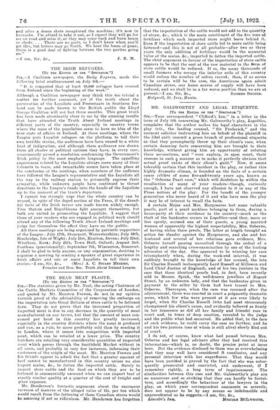THE DEAD MEAT PLAGUE.
[To THE EDITOR OF THE " SPECTATOR."]
Sia,—The statistics given by Mr. Neal, the acting Chairman of the Cattle Markets Committee of the Corporation of London, and quoted by Mr. Moreton Frewen, do not in my opinion furnish proof of the advisability of removing the embargo on the importation into Great Britain of store cattle to be fattened here. They do not prove that the increased proportion of imported meat is due to any decrease in the quantity of meat manufactured on our farms, but that the amount of meat con- sumed per head in this country has greatly increased, especially in the country districts where the meat is produced and can, as a rule, be more profitably sold than by sending it to London, where it comes into competition with imported meat, which can be retailed at a lower price. The country butchers are retailing very considerable quantities of imported meat which passes through the Smithfield Market without in all cases, and prohebly in very few instances, informing their customers of the origin of the meat. Mr. Moreton Frewen and his friends appear to admit the fact that a greater amount of beef cannot be manufactured in this country unless we also import maize, &c., to fatten the imported cattle. Surely to import store cattle and the food on which they are to be fattened is commercially unsound when we can import beef of exactly similar quality at a quarter of the cost of freight and ether expenses.
Mr. Henderson's fantastic argument about the enormous increase of manure of the alleged value of 12s. per ton which would result from the fattening of these Canadian stores would be amusing if not so ridiculous. Mr. Henderson has forgotten that the importation of the cattle would not add to the quantity of straw, &c., which is the main constituent of the five tons of fertilizer which each imported store might leave behind it. Even if the importation of store cattle led to more cattle being fattened—and this is not at all probable—after two or three years the only addition of fertilizer would be the manurial value of the maize, &c., imported to fatten the imported cattle. The chief argument in favour of the importation of store cattle appears to be that the cost of the raw material in the form of store cattle would be reduced. If so, the many thousands of small farmers who occupy the inferior soils of this country would reduce the number of calves reared; then, if as seems to be certain will be the case, the Americans again admit Canadian stores, our home source of supply will have been reduced, and we shall be in a far worse position than we are at
Holywell, St. Ives, Hunts.


































 Previous page
Previous page